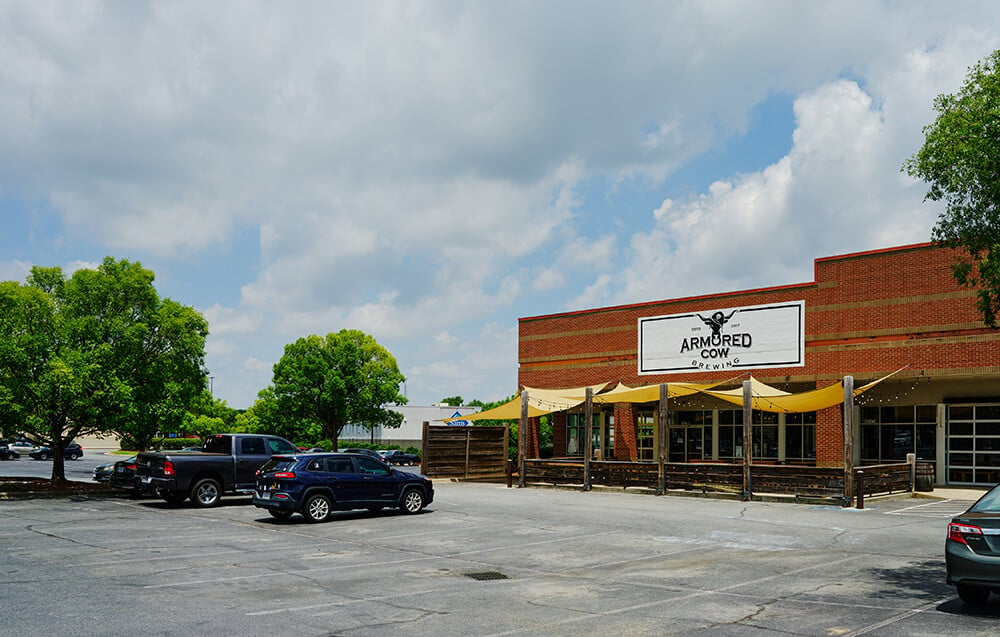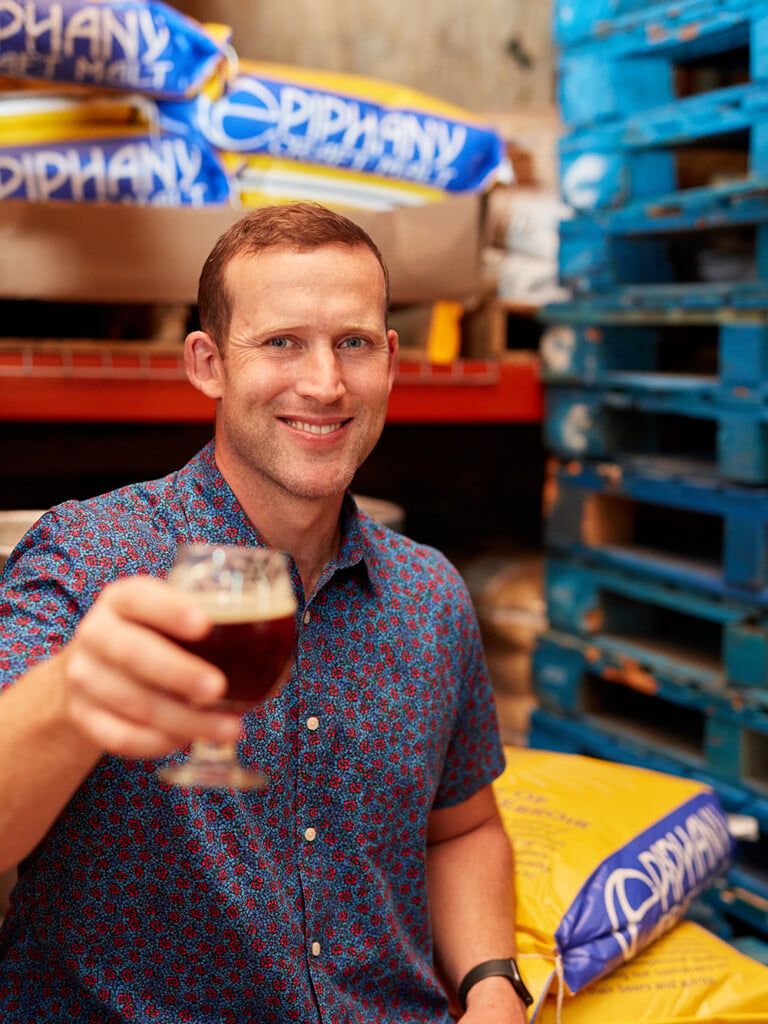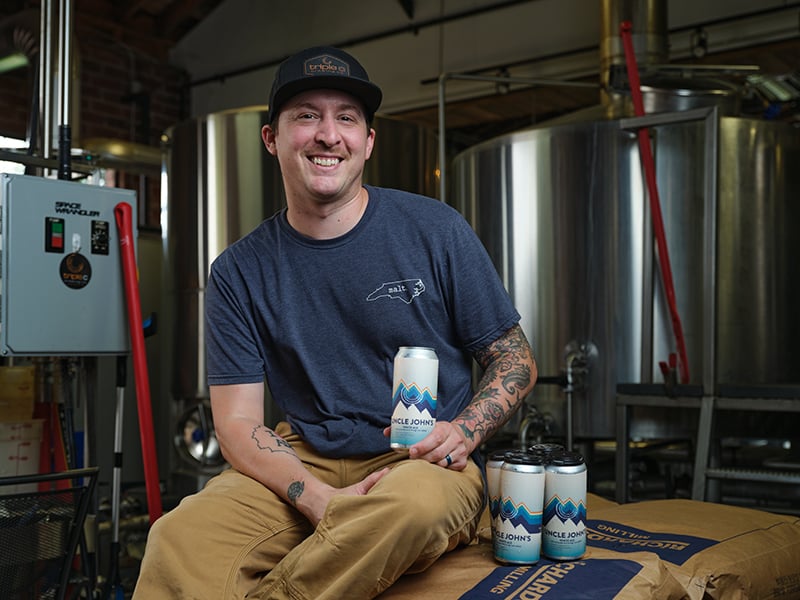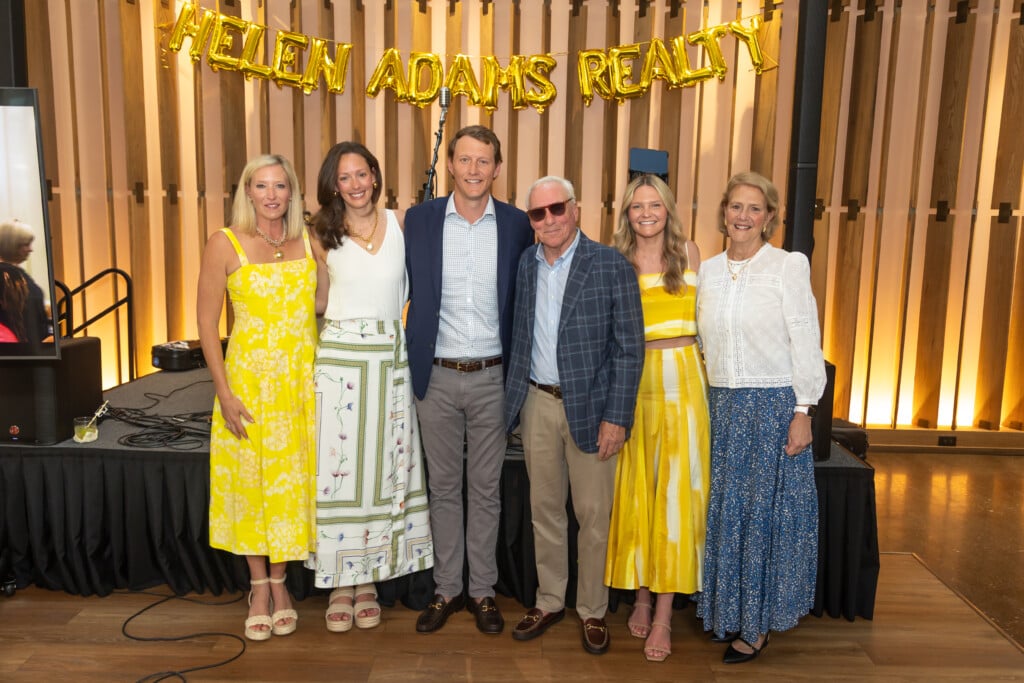The Lonely Brewery In University City
University City has people, money, access, growth—why does it have only one brewery?

Armored Cow Brewing sits alone in its pasture. Around it, within a shopping center in the crook of Interstate 85 and West W.T. Harris Boulevard, are the kinds of big-box retail outlets that for decades have defined University City: a Guitar Center, an Office Depot, a Ross Dress for Less. An Applebee’s is just up JW Clay Boulevard, which shares the street with the brewery. They’re all businesses designed and arranged around parking lots, and in one corner is an enterprise—a craft brewery—that typically heralds the dense, walkable, mixed-use ethos of New Urbanism. Yet here’s Armored Cow, trying to maintain its sentry’s spot within old suburbanism.
The brewery has succeeded at that, at least, since it opened in 2019. COVID took a toll, as it did for everyone, but business has gradually improved since. “It hasn’t been easy,” says Andrew Kalinoski, the 55-year-old Army veteran who co-owns Armored Cow with his wife, Stephanie Macall. “But we’re doing good.”
Still, in a city where the number of independent breweries has become a running joke, Armored Cow remains the only operation of its kind in University City. Why?
One reason: University City, although well within the city now, developed in the 1960s, an era when edge-of-town shopping centers built for cars dominated urban design. That means a scarcity of the kinds of old, inexpensive industrial buildings that served as incubators for Charlotte’s first craft brewers in neighborhoods like South End and NoDa. (Those buildings usually came with water and sewer hookups, another advantage.)
What at first might seem like a robust market for alcohol sales—UNC Charlotte, which enrolled a school-record 31,091 students in 2024—turns out to be a mirage. “I mean, we do have a large doctorate and master’s population,” says Drew Gaertner, senior manager of economic and land development for University City Partners. “But, out of 30,000, a large number aren’t even of drinking age.” And college undergraduates aren’t known as a demographic likely to pay $7 or $8 for a pint of beer, no matter how good it is.
So Armored Cow manages with the clientele it has, a mix of middle-aged and twentysomething folks who duck in for a beer or two or use the taproom to meet up. On a recent, sweltering Tuesday afternoon, 12 people sip from their pint glasses at the scattered tables. The number grows as 5 p.m. approaches. Clad in jeans, baseball cap, and a Grateful Dead T-shirt, Kalinoski sips his own creation, a Helles lager called Shake That Axe, and recounts his route to brewery ownership.
He was stationed at an Army post in Germany, tried some bier, and thought: Oh, this is what beer tastes like. Home brewing led to a position at Sycamore Brewing, where he developed a series of gluten-free beers inspired by his mother-in-law, who has celiac disease. Family members encouraged him to open his own place. Kalinoski searched around Harrisburg, where he and Macall live, but a real estate agent showed him the open space near the Office Depot. (The name “Armored Cow” comes from a World War II-era soldier’s term for canned milk.)

Armored Cows’ beers include Hellfire Club a fruited sour that won a silver medal at the Great American Beer Festival last year.
“I felt like the population could handle it,” he says. “At the time, there wasn’t a brewery out here.” Price was a factor, too: Retail space in University City generally costs about $21 per square foot per year, according to Regent Commercial Real Estate in Charlotte. The price in and near uptown is about $30.
But the deal came with a tradeoff. Space costs more in dense urban areas with little parking, but business owners gain the benefit of foot traffic. It costs less with plenty of parking in the suburbs, but patrons don’t just drop in for a beer on the way to something else—unless, as Kalinoski says happens sometimes, Guitar Center shoppers decide to cross the parking lot for a cold one.
University City Partners adopted a long-range plan in 2021 that aims to make the area more connected and pedestrian-friendly. Gaertner points to a pair of ongoing projects—a streetscaping of JW Clay and construction of a bridge over I-85 to connect the retail center with University Research Park—designed to enable the foot traffic that benefits businesses like breweries. He says a less car-centric University City just hasn’t materialized yet: “We’re hoping it will, though.”





